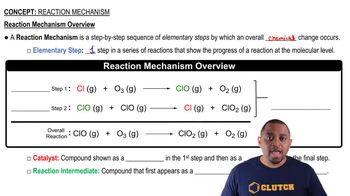Phenylephrine, an organic substance with molecular formula C9H13NO2, is used as a nasal decongenstant in over-thecounter medications. The molecular structure of phenylephrine is shown below using the usual shortcut organic structure. (c) Would you expect a solution of phenylephrine hydrochloride to be acidic, neutral, or basic?
NH31g2 and HCl(g) react to form the ionic solid NH4Cl1s2. Which substance is the Brønsted–Lowry acid in this reaction? Which is the Brønsted–Lowry base?
 Verified step by step guidance
Verified step by step guidance
Verified Solution
Key Concepts
Brønsted–Lowry Acid-Base Theory

Ionic Compounds

Reaction Mechanism

Consider the molecular models shown here, where X represents a halogen atom. (a) If X is the same atom in both molecules, which molecule will be more acidic?
Consider the molecular models shown here, where X represents a halogen atom. (b) Does the acidity of each molecule increase or decrease as the electronegativity of the atom X increases?
Which of the following statements is false? (a) An Arrhenius base increases the concentration of OH- in water. (b) A Brønsted-Lowry base is a proton acceptor. (c) Water can act as a Brønsted–Lowry acid. (d) Water can act as a Brønsted–Lowry base. (e) Any compound that contains an –OH group acts as a Brønsted-Lowry base.
Identify the Lewis acid and Lewis base among the reactants in each of the following reactions: (d) HIO1lq2 + NH2-1lq2 Δ NH31lq2 + IO-1lq2(lq denotes liquid ammonia as solvent)
Identify the Lewis acid and Lewis base in each of the following reactions: (b) FeBr31s2 + Br-1aq2 Δ FeBr4-1aq2
